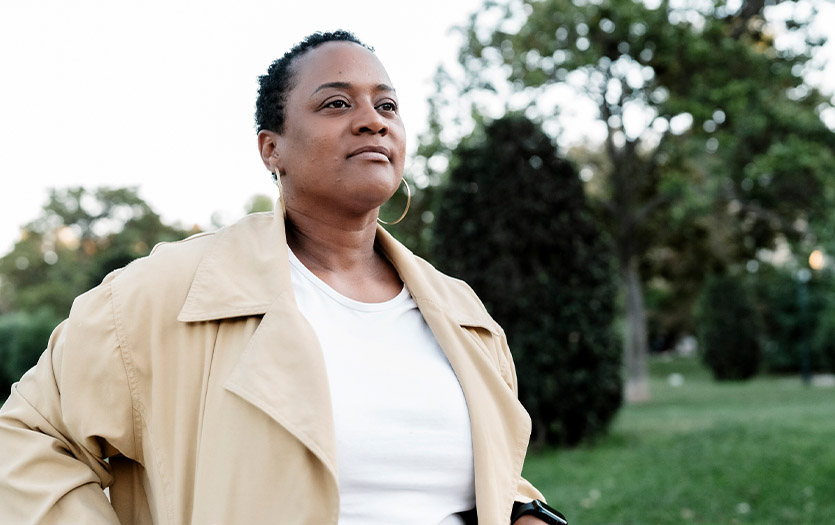
In September 2016, Vicki Pickelheimer, a Nutritional Services team member at Parkview Regional Medical Center, was diagnosed with Amyotrophic Lateral Sclerosis (ALS). After her condition worsened, Vicki moved into long term disability, unable to continue her work, serving patients meals in their rooms.
Now, as she approaches the two-year mark of her diagnosis, she feels moved to raise awareness about terminal conditions such as the one she is battling. “Anyone can get ALS,” Vicki said. “This is a disease with no survivors. Your diagnosis is a death sentence.”
While Vicki doesn’t try to hide her frustration about her future at the hands of this condition, or the prognosis for others diagnosed with ALS, she does find peace in the people around her. “I’m empowered through faith and prayer. I live for the day I have been blessed with. Tomorrow is promised to no one. So with God by my side, I make it the best day it can be with what I have. I have overwhelming support and love from my amazing husband, my daughter and my Parkview family.
The biggest lesson through all of this has been that anything can happen to change your life in a blink of an eye. I went to sleep, woke up the next day and well .... Here I am fighting for my life. Every day is a blessing. Look for good in everything, everyone. Be grateful.”
Patient empowerment through ACP
For patients like Vicki, facing a life-altering diagnosis, the future can feel bleak and uncertain. But Advance Care Planning (ACP) can offer an opportunity to have powerful discussions about what the patient wants those weeks, months and years ahead to look like. We asked Chris Brinneman, MSW, LCSW, Advance Care Planning specialist, and Amy Spallinger, MSW, LCSW, Advance Care Planning specialist, to answer our questions about the important role of ACP in end of life care.
How can ACP empower someone after a terminal diagnosis?
There are things that we cannot control in life, which can leave us feeling powerless at times. The process of ACP can help people take back some control. By exploring values, beliefs and life experiences, a person is empowered to make choices that reflect individualized wishes. ACP conversations may result in the completion of written documents that clearly state those wishes and identify a surrogate decision maker who can make medical decisions when individuals can no longer make their own decisions. Each person has the authority to designate who that surrogate decision maker will be.
What are some of the questions ACP will prompt a patient to explore?
- What does a good day look like; who will be with you and what would you do?
- How do your personal values and life experiences impact health care decisions?
- What role does religion, faith and spirituality play in how you live your life?
- Under what circumstances would you want the goals for medical treatment to switch from attempting to prolong life to focusing on comfort?
- What will help me to live well at this point in my life?
Why are these conversations and considerations so important, particularly in a terminal situation?
ACP is important because families and medical teams cannot honor wishes for future medical care if they don’t know what those wishes actually are. Many people assume that their loved one’s wishes are the same as their own and make decisions based on their personal values and beliefs, unless they have had the opportunity to have an ACP conversation.
ACP conversations focus on values, beliefs, fears and choices, but can differ depending on the current state of the patient’s health. For healthier adults, the conversations focus on guiding individuals in choosing someone to speak for them if they cannot speak for themselves and considering treatment choices based on a plausible scenario. For those who are dealing with chronic illness, ACP conversations help to focus on understanding the illness, learning about living with the illness and identifying what a “bad outcome” would look like. For those in later stages of a chronic illness or those with a terminal illness, the ACP conversation focuses on specific treatments that the individual may or may not want (resuscitation, aggressive medical care vs comfort care, hospitalization or care at home).
Also, ACP has been shown to help prepare families for the death of a loved one, to resolve family conflict, to bring families closer together, and to help lower the incidence of stress, depression and anxiety in family members. Ira Byock, an American physician, author and advocate for palliative care, is quoted as saying, “I have an advance directive, not because I have a serious illness, but because I have a family.” ACP is truly a gift to give to loved ones.
How can ACP change the quality of life in someone’s final days?
Historically, many people have waited to start talking about these things until they are near the end of life. Prior to that, people seem to believe it is too early to have these kind of discussions. Really, you can never engage in ACP too early. Often times, patients and families attempt ACP when it’s too late, after an individual can no longer make their own decisions.
ACP can help people identify the things that are most important to guide their treatment decisions so that, in the end, they are getting the care they want and avoiding any burdensome, unwanted treatments. A 2009 survey revealed that, though 70 percent of people state that they want to die at home, only 30 percent actually end up doing so. ACP can help you and your family identify how your final days are going to be spent, where you will be, who will be present and what will be happening.
What would you tell someone who is fearful of ACP?
ACP is good for all adults, regardless of age and health. Not all people will require the same conversation. Over time, ACP conversation content and wishes may change. What you think that you want when you are a healthy adult can be different after you are diagnosed and are living with a chronic condition; and that can be different when you are diagnosed with a life-limiting terminal illness. None of us will elude death and talking about values, wishes and choices will not change a person’s health condition, but ACP conversations can change how the final months, weeks and days look, depending on health care choices. The best way to do that is by participating in a facilitated ACP conversation, exploring values, considering faith, spirituality and culture beliefs, appointing a surrogate decision maker and making your wishes known.
How can Parkview support someone through the ACP process?
Over time, Parkview will invite all adults to participate in ACP. Using an internationally known model of ACP called Respecting Choices®, Parkview is helping people have conversations with certified facilitators. These facilitators have completed online learning modules and classroom coursework in order to earn their certification. The ACP facilitators guide people through an ACP conversation, making sure their wishes are documented and, if desired, helping to complete standardized advance directive documents. Plus, MyChart even allows patients to answer some thought-provoking questions related to ACP that are then uploaded into their medical record.
ACP is not about taking away hope. ACP is about empowerment and redefining hope as individuals will know that others are listening, that they are being heard, and that their choices and preferences for future medical care will be respected.
Vicki and others will be raising awareness for their cause at the Walk to Defeat ALS, Saturday, October 13, at Headwaters Park. Learn more about the event and how you can get involved here.



